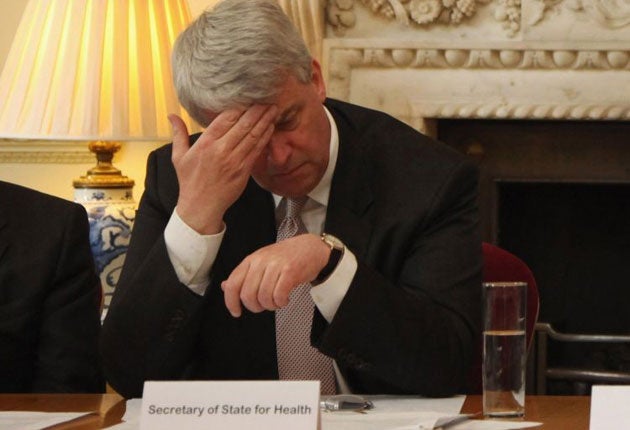Business plan hold-up adds to uncertainty over Health Bill

Your support helps us to tell the story
From reproductive rights to climate change to Big Tech, The Independent is on the ground when the story is developing. Whether it's investigating the financials of Elon Musk's pro-Trump PAC or producing our latest documentary, 'The A Word', which shines a light on the American women fighting for reproductive rights, we know how important it is to parse out the facts from the messaging.
At such a critical moment in US history, we need reporters on the ground. Your donation allows us to keep sending journalists to speak to both sides of the story.
The Independent is trusted by Americans across the entire political spectrum. And unlike many other quality news outlets, we choose not to lock Americans out of our reporting and analysis with paywalls. We believe quality journalism should be available to everyone, paid for by those who can afford it.
Your support makes all the difference.There is further uncertainty around the Government's reforms to the controversial Health Bill after it delayed publishing an expected business plan for the Department of Health.
While other Whitehall departments have published details of their intentions for the next four years, the Department of Health said yesterday it would not release any information until its "listening exercise" on the controversial shake-up is complete.
The move comes as Health Secretary Andrew Lansley struggles to defend the reforms, which include putting GPs in charge of commissioning services.
Across the board government departments have missed dozens of their own key targets leaving the business, environment and "big society" projects months behind schedule. In total, 87 "milestones" have been missed, forcing ministers to rewrite the deadlines to give themselves extra time.
Among the biggest hold-ups were:
* Five-month delay in bringing forward measures to end unfair bank and credit card charges
* Six-month delay in publishing the public services reform white paper
* 12-month delay in establishing the big society bank
* Four-month delay in reforming the Sure Start programme
But it is problems in the Department of Health which continue to provide the biggest headache for ministers.
On a visit to a hospital in Sheffield yesterday, Deputy Prime Minister Nick Clegg confirmed that one area where the Government will concede ground is to allow nurses to sit on the newly created commissioning boards.
Mr Clegg said: "I'm personally convinced we should get nurses right there, on the decision-making body that in future will make the decisions about how the NHS works in terms of where the money goes," he said.
Later he was due to be presented with a petition of more than 300,000 signatures put together by the pressure group 38 Degree – who were partly responsible for the previous Government climbdown on selling off Britain's forests.
Geraldine O'Connor, 38 Degrees member and a constituent of Mr Clegg, said they still expected the Government to go much further.
"So many doctors, nurses, and health charities are warning that Lansley's NHS plan could mean the end of the NHS as we know it," she said. "I know that if enough of us work together, we can stop them."
Mr Clegg vowed there would be no "backdoor privatisation" of the NHS.
"We are not going to introduce some disruptive revolution to the NHS," he said. "We are not, I repeat not, going to privatise the NHS. We are not going to turn the concept of competition into some kind of guiding dogma."
"I'm very confident when you see what we will come up with at the end of the process you will be comfortable."
However, new research, released by the Department of Health suggested that the majority of the public were already broadly happy with the NHS.
The survey, carried out by Mori in December found that 70 per cent of were satisfied with the NHS.
At that time a majority of people thought that the NHS was getting better rather than worse.
Join our commenting forum
Join thought-provoking conversations, follow other Independent readers and see their replies
Comments